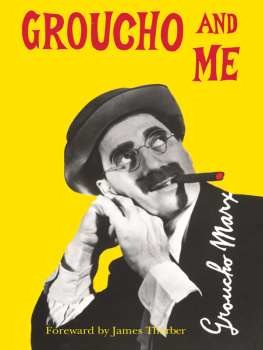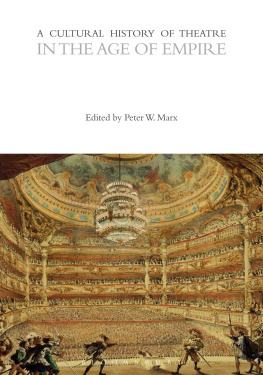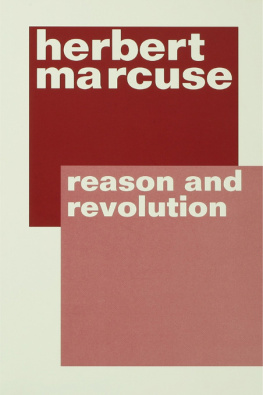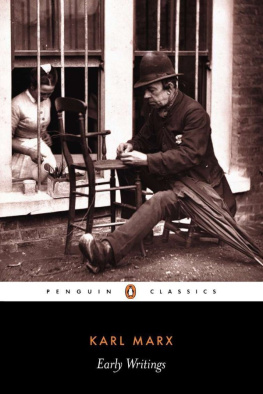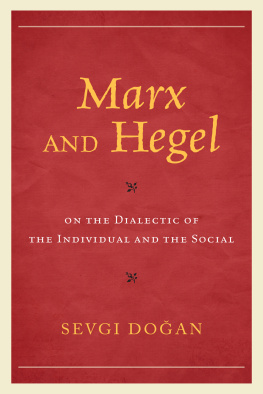
EARLY WRITINGS
K ARL M ARX was born in Trier in 1818 of a German-Jewish family converted to Christianity. As a student in Bonn and Berlin he was influenced by Hegels dialectic, but he later reacted against idealist philosophy and began to develop his theory of historical materialism. He related the state of society to its economic foundations and mode of production, and recommended armed revolution on the part of the proletariat. In Paris in 1844 Marx met Friedrich Engels, with whom he formed a life-long partnership. Together they prepared the Manifesto of the Communist Party (1848) as a statement of the Communist Leagues policy. In 1848 Marx returned to Germany and took an active part in the unsuccessful democratic revolution. The following year he arrived in England as a refugee and lived in London until his death in 1883. Helped financially by Engels, Marx and his family nevertheless lived in great poverty. After years of research (mostly carried out in the British Museum), he published in 1867 the first volume of his great work, Capital. From 1864 to 1872 Marx played a leading role in the International Working Mens Association, and his last years saw the development of the first mass workers parties founded on avowedly Marxist principles. Besides the two posthumous volumes of Capital compiled by Engels, Karl Marxs other writings include The German Ideology, The Poverty of Philosophy, The 18th Brumaire of Louis Bonaparte, The Civil War in France, A Contribution to the Critique of Political Economy, Grundrisse:Foundations of the Critique of Political Economy and Theories of Surplus-Value.
KARL MARX
EARLY WRITINGS
INTRODUCED BY LUCIO COLLETTI
TRANSLATED BY RODNEY LIVINGSTONE
AND GREGOR BENTON
PENGUIN BOOKS
in association with New Left Review
PENGUIN BOOKS
Published by the Penguin Group
Penguin Books Ltd, 80 Strand, London WC2R 0RL , England
Penguin Putnam Inc., 375 Hudson Street, New York, New York 10014, USA
Penguin Books Australia Ltd, Ringwood, Victoria, Australia
Penguin Books Canada Ltd, 10 Alcorn Avenue, Toronto, Ontario, Canada M4V 3B2
Penguin Books India (P) Ltd, 11 Community Centre, Panchsheel Park, New Delhi 110 017, India
Penguin Books (NZ) Ltd, Cnr Rosedale and Airborne Roads, Albany, Auckland, New Zealand
Penguin Books (South Africa) (Pty) Ltd, 24 Sturdee Avenue, Rosebank 2196 South Africa
Penguin Books Ltd, Registered Offices: 80 Strand, London WC2R 0RL , England
www.penguin.com
New Left Review, 7 Carlisle Street, London W1V 5RG
This edition first published in Pelican Books 1975
Reprinted in Penguin Classics 1992
23
Selection and Notes copyright New Left Review, 1974
Introduction copyright Lucio Colletti, 1974; translation Tom Nairn, 1974
Translations of Critique of Hegels Doctrine of the State, Letters from the Franco-German
Yearbooks, James MillsElements of Political Economy and Critical Notes on the Article
The King of Prussia and Social Reform copyright Rodney Livingstone, 1974
Translations of Economic and Philosophical Manuscripts, On the Jewish Question,
A Contribution to the Critique of Hegels Philosophy of Right.
Introduction and the Glossary copyright Gregor Benton, 1974
Translations in the Appendix copyright Lawrence & Wishart, 1973, 1971
Except in the United States of America, this book is sold subject to the condition that it shall not, by way of trade or otherwise, be lent, re-sold, hired out, or otherwise circulated without the publishers prior consent in any form of binding or cover other than that in which it is published and without a similar condition including this condition being imposed on the subsequent purchaser
ISBN: 978-0-14-193570-6
Contents
Critique of Hegels
Doctrine of the State (1843)
Letters from the
Franco-German Yearbooks(1843)
A Contribution to the Critique of
Hegels Philosophy of Right.
Introduction (18434)
Excerpts from James Mills
Elements of Political Economy
(1844)
Economic and Philosophical
Manuscripts (1844)
Critical Notes on the Article
The King of Prussia and
Social Reform.
By a Prussian (1844)
B. Preface (to A Contribution to
the Critique of
Political Economy)
Chronology of Marxs Life
1818 to August 1844
Note on Previous Editions of the
Works of Marx and Engels
Chronology of Works
by Marx and Engels
Introduction
I
The writings contained in this volume were produced by Marx during the two years 18434, when he was little more than twenty-five years old. Some were published at once: The Jewish Question, for example, and the Contribution to the Critique of Hegels Philosophy of Right. Introduction. Others, like the Critique of Hegels Doctrine of the State and the famous Economic and Philosophical Manuscripts, were published only posthumously, in 1927 and 1932 respectively. When it is remembered that the complete text of The German Ideology was not printed until 1932 and that The Holy Family, first published in 1845, rapidly became a collectors item, the reader will understand why Marxs youthful philosophical work was for the most part only discovered comparatively recently.
It is true that Mehring reprinted some of Marxs early published work in 1902 (in his Aus dem literarischen Nachlass). But the more important writings remained unknown. And in any case by that time the whole first generation of Marxian interpreters and disciples including Kautsky, Plekhanov, Bernstein and Labriola had already formed their ideas. So the Marxism of the Second International was constituted in almost total ignorance of the difficult and intricate process through which Marx had passed in the years from 1843 to 1845, as he formulated historical materialism for the first time.
Up to the end of the last century (and even later) little more was known about this process than what Marx had said of it himself, in a few sentences of the 1859 Preface to A Contribution to the Critique of Political Economy. Apart from this, the only basic authority to hand was Engelss Ludwig Feuerbach (1888): a work in which one of the original protagonists of Marxism provided (or seemed to provide) a most authoritative account of all that was essential, all that was really worth knowing, about their relationship to Feuerbach and Hegel and the part these men played in the formation of Marxs thought.
A whole generation of Marxist theorists knew next to nothing (through no fault of their own) of Marxs early philosophical writings: it is vital to keep this fact firmly in mind, if one wishes to understand one decisively important circumstance. The first generation of Marxists approached Marx via Capital and his other published writings (mainly economic, historical or political), and were unable to understand fully the philosophical precedents and background underlying them. They could not know the reasons, philosophical as well as practical, which had induced Marx to give up philosophy after his break with Hegel and Feuerbach; induced him to devote himself to the analysis of modern capitalist society, instead of going on to write a philosophical treatise of his own. The few available texts on this theme, like the Theses on Feuerbach, the Preface (already mentioned) to A Contribution to the Critique of Political Economy, and the Postface to the second edition of volume I of Capital,
Next page

